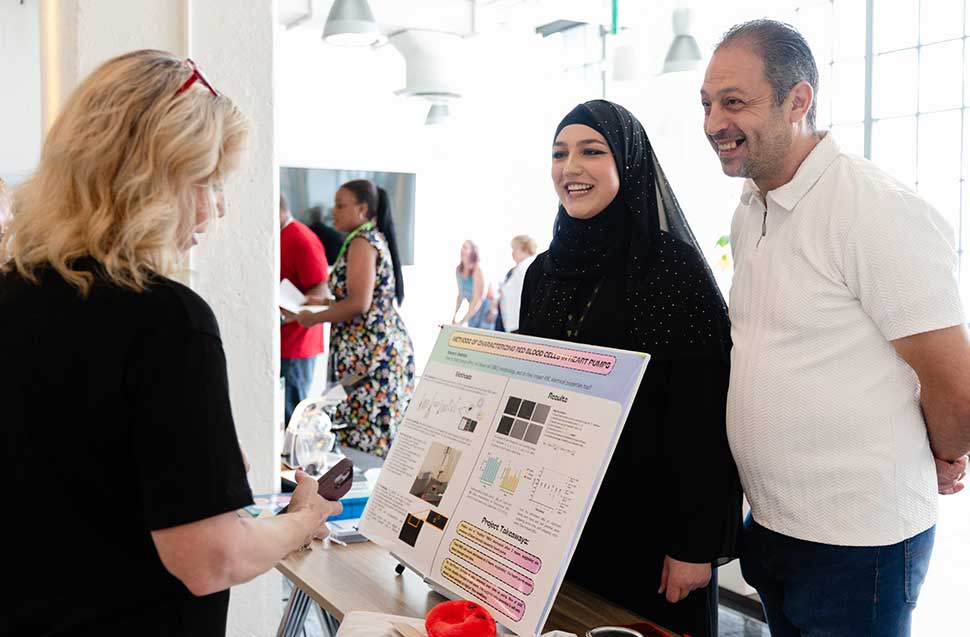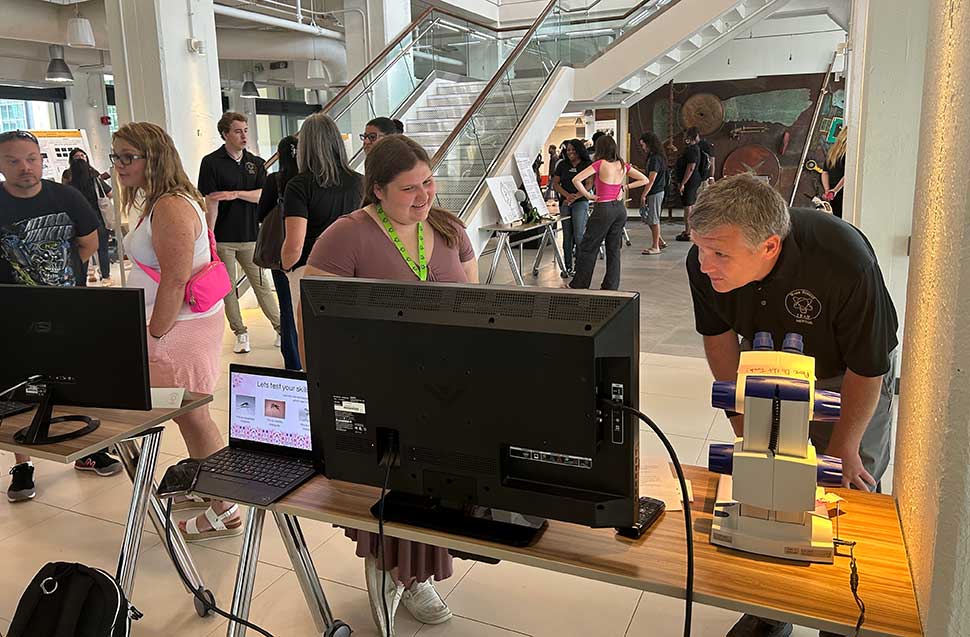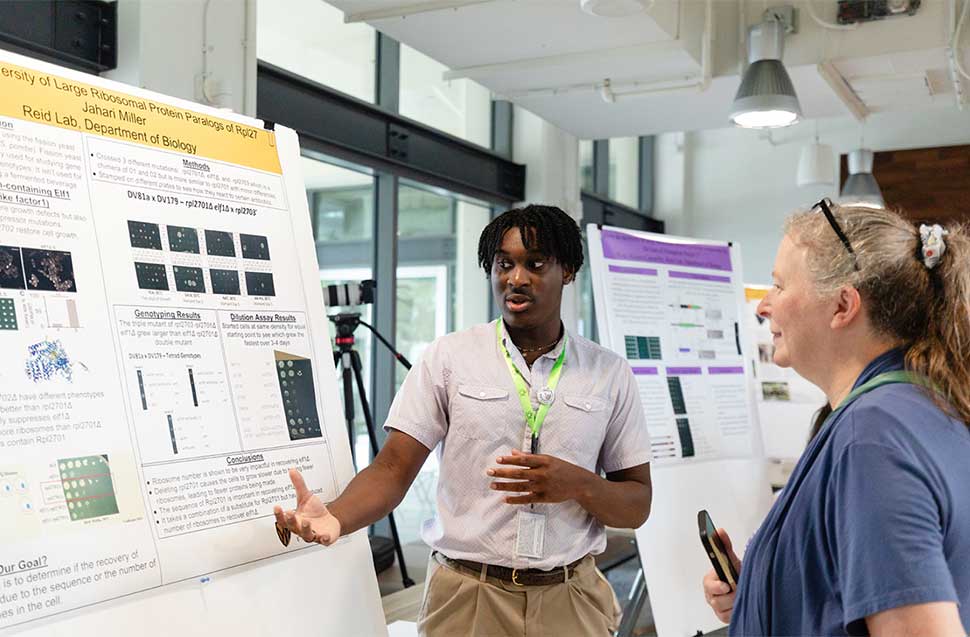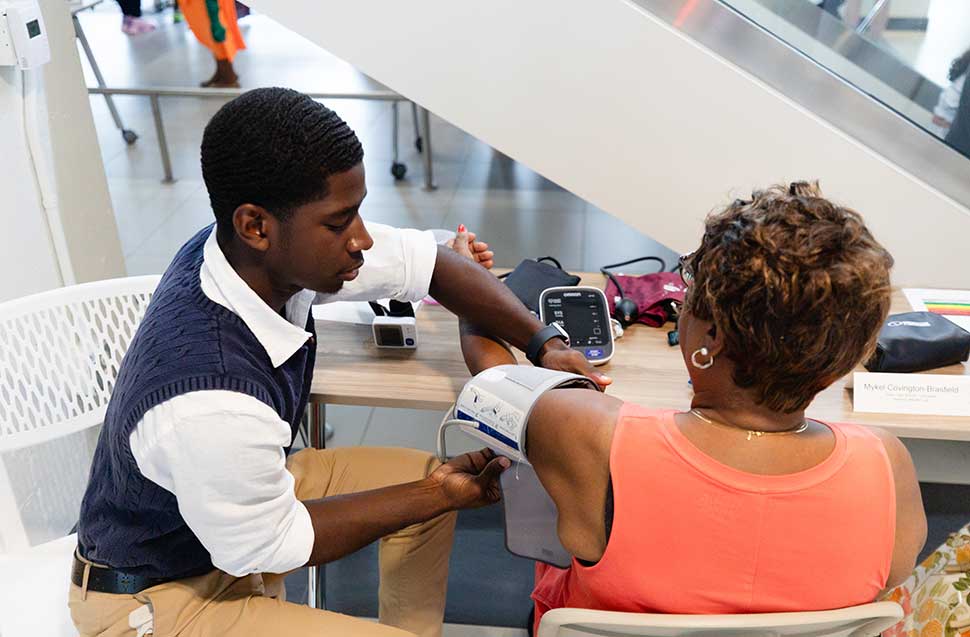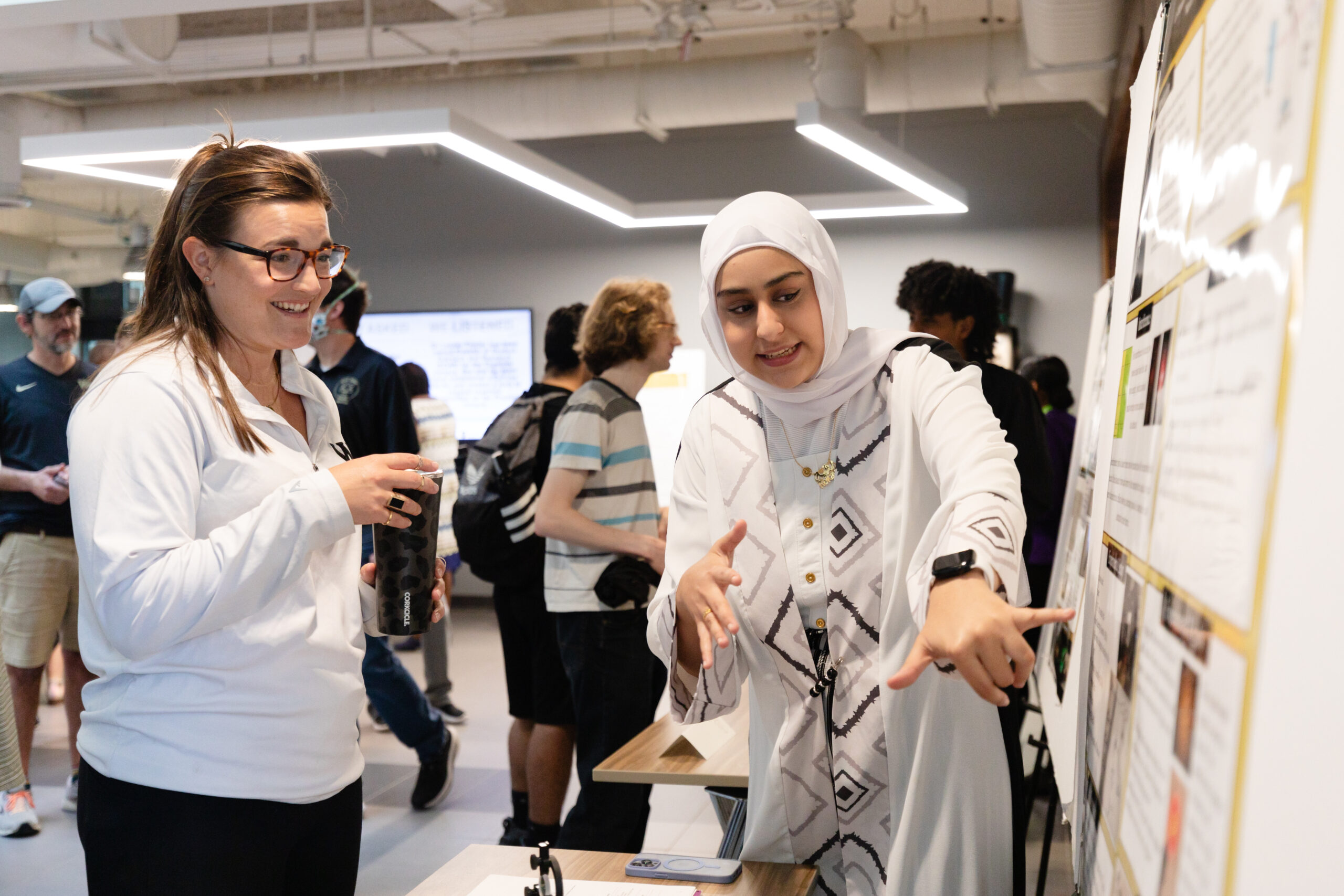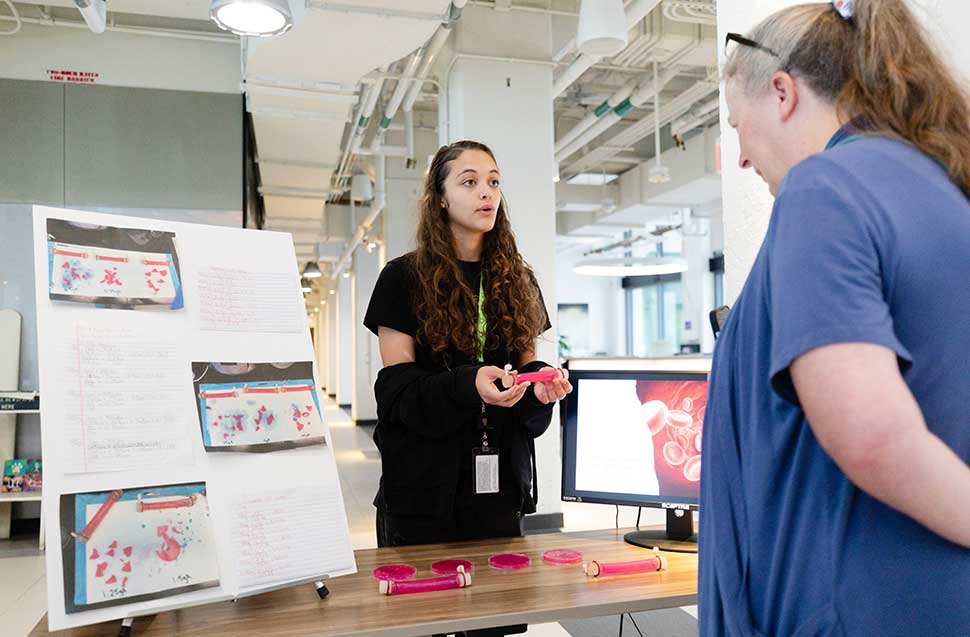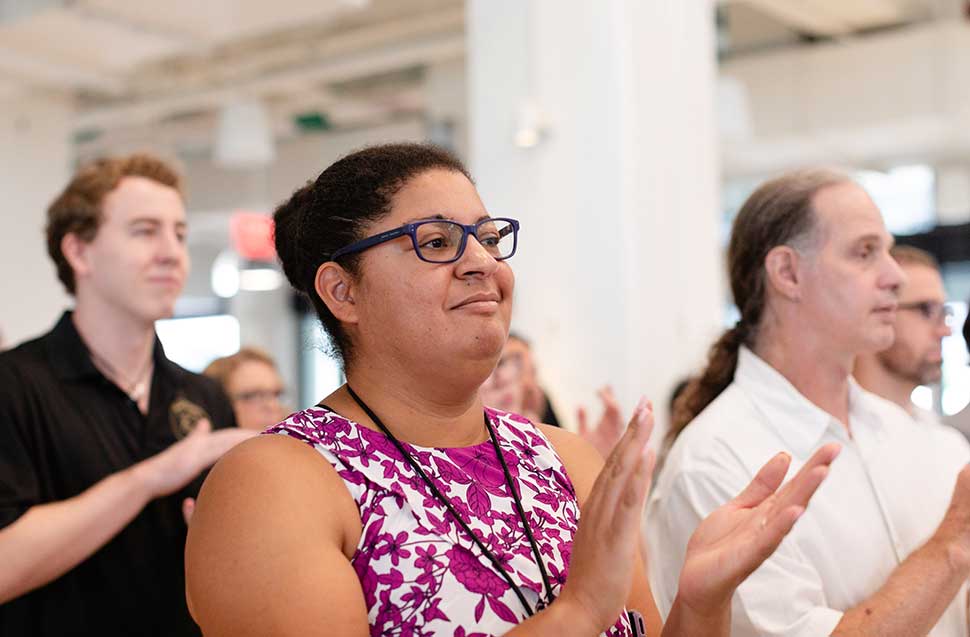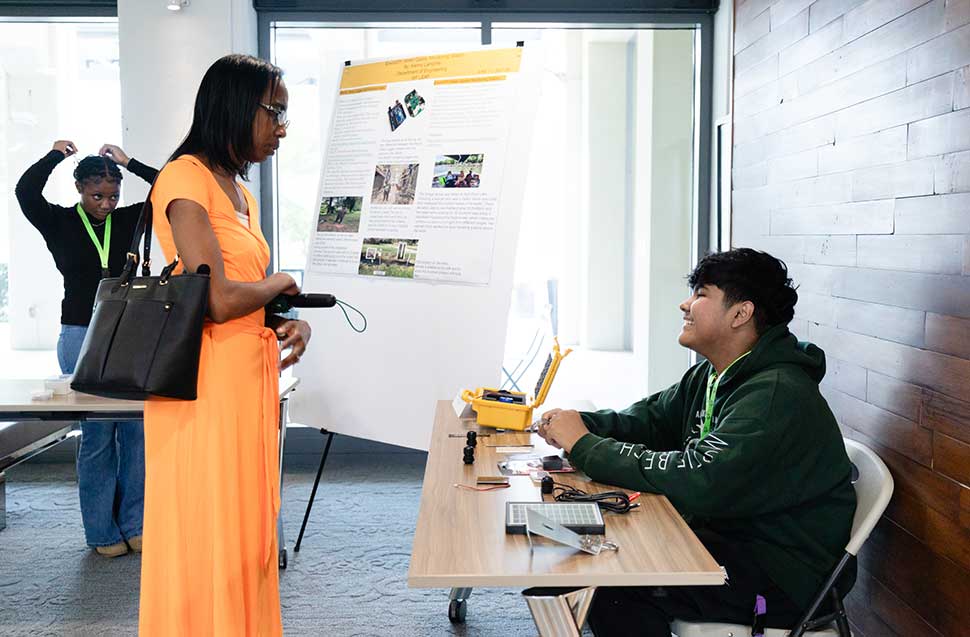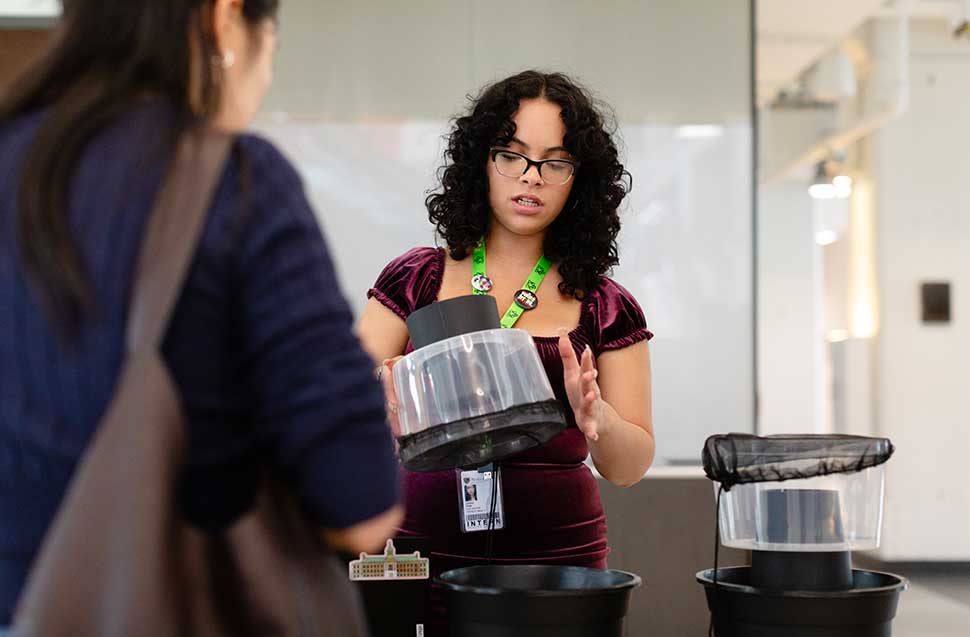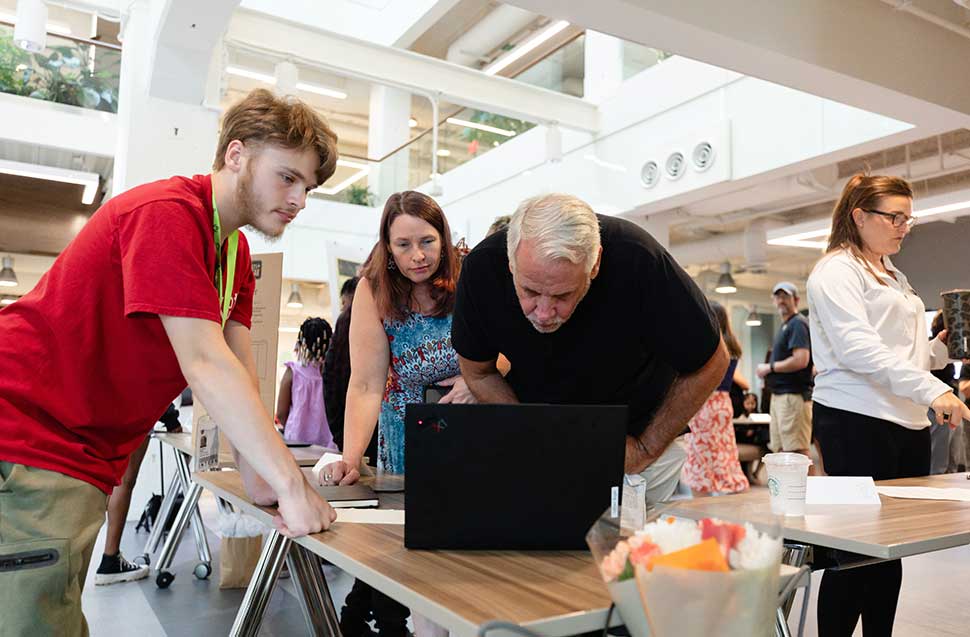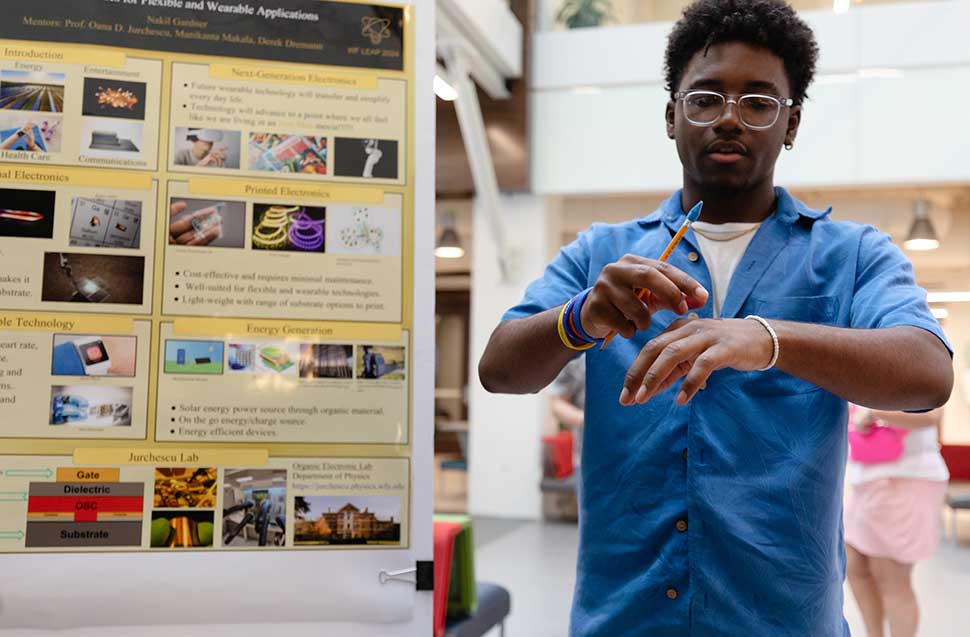Teens from Title I schools dive into STEM with WFU program
Students showcase research projects alongside Wake Forest faculty
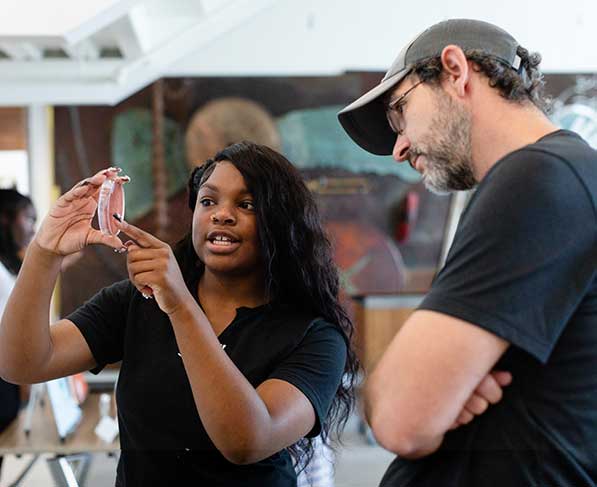
Sixteen-year-old Madelyne Tucker arrives early to set up her display for the WF LEAP symposium in the lobby of Wake Downtown. There’s a microscope, computer and mosquitoes.
As visitors stop by her booth, she asks them to look under the microscope and pick which type of mosquito it is by looking at three photos.
“We set traps and gathered mosquitos in Winston-Salem,” said Tucker. “Getting mosquitos fully intact and being able to identify all of them wasn’t so easy at first. Some mosquitos are linked to certain diseases, so it was important to make sure that we were able to get a large sample each time.”
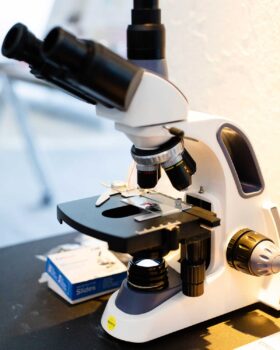
Tucker, a rising junior attending North Forsyth, is among 25 high school students from six Title I Winston-Salem/Forsyth County High Schools participating in the Wake Forest LEAP (Lab Experiences: Academics and Professions) program.
WF LEAP offers these students a unique opportunity to gain hands-on lab research experience while earning a paid internship. The goal is to increase the number of traditionally underrepresented youth and minorities in the STEM education pipeline.
“Our LEAP interns also measured the temperature on collection days to explore if climate change might have an impact on these different populations of mosquitoes,” said Regina Joyce Cordy, associate professor of biology. “These high schoolers are assisting with innovative research that is being conducted both on and off campus.”
Support and Development
The program pairs each student with a Wake Forest professor and a co-mentor, who guide them through the foundations of their discipline and research. Over six weeks, from June 17 to July 26, students work on individual projects ranging from cancer cell responses to water treatment technology to improving muscle mass for older adults.
Rather than earning money in more traditional high school summer jobs, students accepted into the program have a paid summer experience that directly links to a desired career or educational discipline.
“This program can be life-changing for many students who participate.”Alana James, director of Wake Downtown
“Meals, transportation and other resources are provided to help break down any barriers or challenges that these students may face,” James added.
The WF LEAP program has provided Tucker with a new lens about her future. “I’m so grateful I have been given this opportunity,” she said. “I learned so much about troubleshooting and teamwork. This program has impacted me in so many ways. It’s made me a stronger person, and I feel like anything is possible.”
Student Experiences: Transformative Impact
Students not only gain lab experience during the program, but also participate in professional development workshops on career exploration, resume development, networking, public speaking, and research, in collaboration with Wake Forest’s Office of Personal and Career Development, ZSR Library, and the Wake Forest Speaking Center and Writing Center.
Across the lobby from Tucker and her mosquitoes, 17-year-old Mykel Covington-Brasfield from Glenn High School is practicing his speech to introduce his research project. He interned with Health and Exercise Science professor Shannon Mihalko. “This program helped me learn about resume writing, networking, collaboration and interviewing,” he said. “Just being able to connect with a professional in a career field and ask them questions, it was such a great learning experience,” he said.
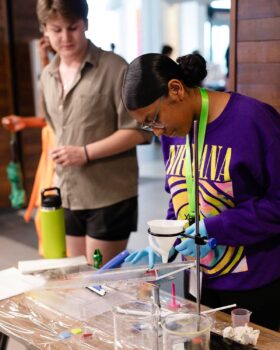
Monserrat Bernal Acevedo, an 11th grader at Kennedy High School, is getting ready to start a demonstration. “I’m making a particle bed, which creates erosion when you pour the fluid in,” explained Acevedo. “I have learned how to run experiments, analyze pictures, and even created a manual on how to run the experiment.”
Acevedo interned in the Fluid Dynamics Lab at Wake Downtown with WFU Assistant Professor of Mathematics Claudia Falcon.
“I love to see the students learn about fluid dynamics and that math can be hands-on,” said Falcon, who has served as LEAP mentor for the past three years. “ I myself benefited a lot from doing undergraduate research in the fluids lab, and so I’m thrilled seeing the students learn about fluids so early on.”
Beyond the lab
Throughout their experience, students also engage in various activities and field trips, including visits to Mazie Woodruff Aviation Tech Lab at the Smith Reynolds Airport to learn about drone use in science and aviation careers, meetings with researchers at the Wake Forest Institute for Regenerative Medicine, and learning how to use a variety of technology and tools at the WS Mixxer Community Makerspace.
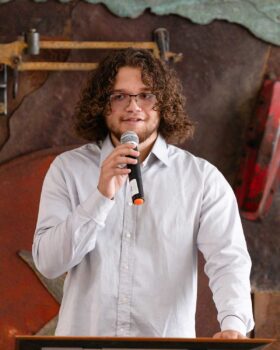
Andre Garcia, a rising senior at Parkland High School, found that the LEAP program sparked his interest in welding or aviation. “My favorite part of the program wasn’t in the lab, but the field trips. I went to the maker space and was able to get an additional internship there. It showed me to talk to more people, be open and network to open more opportunities,” he said.
Garcia is one of eight siblings and said the paid internship made it easier for him to participate. He previously wasn’t considering college, but now sees it as a possibility.
“I was stuck on not going to college, but this has shown me maybe I can go, and if I do, I would be the first person in my family to go to college.”Andre Garcia, a rising senior at Parkland High School
“It has shown me all that I can do, and more. All of the advice, support, and encouragement has helped me so much,” added Garcia.
Nicole Mize, Andre’s mother, expressed her pride in her son’s accomplishments over the past several weeks. “I definitely have seen a change in him, a shift in him,” she said. “He was dragging along, not wanting to participate in classes. This program has guided him on a different path and he is excited about his senior year. I don’t have to get on him to get up to go. He was dragging along in school, and this gave him something to stand up for, that this is for him, and he is doing it. I’m so proud of him.”
Teacher Advocates
Teachers from each of the Title I high schools in Winston-Salem/Forsyth County Schools serve as a dedicated point of contact for students who wish to apply for LEAP. These teacher advocates assist the LEAP program coordinators by identifying, nominating, and supporting students through the application process.
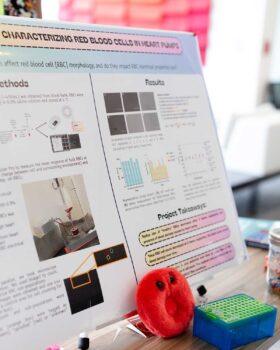
For the past three years, the six schools participating have included: Carver, Glenn, Kennedy, North Forsyth, Parkland IB, and Reynolds. Title I schools are identified by the federal government because they serve a large population of families facing economic challenges.
Sarah Shepard, a teacher advocate at John F. Kennedy High School, got emotional watching her students talk about their success in the program.
“This is so exciting. I have taken so many photos today,” she said. “What I love about this program is that they have us, and other cheerleaders through the Wake Forest mentorship that continues after this program. It’s amazing to see them grow and gain confidence.”
“I have watched these students grow professionally and mature, and they will be able to do so much more next year and be better students,” added Kim Campbell, a teacher at Carver High School.
Planting STEM seeds for future scientists
The LEAP program also provides resources and support that extend beyond the summer, aiming to improve students’ confidence and encourage aspirations in STEM education and careers.
For Jahari Miller, a rising senior at Reynolds High School, working with yeast and studying protein sequences sparked an interest in STEM. “My lab always smelled like bread, which was something to look forward to,” he joked with his friends.
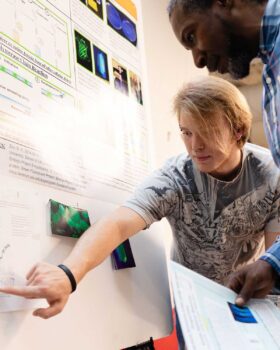
Some of the other research topics include how marine viruses impact carbon and nutrient cycling in the ocean, the impact of (ECMO) circuits on red blood cells and how organic materials can create more flexible electronics.
“We learn from them as much as they learn from us,” said Daniel Kim-Shapiro, professor of physics. “We have these young students interacting with our graduate and undergraduate research students from Wake Forest, who serve as co-mentors and it brings fun and a nice atmosphere in the lab during the summer. Students that I have had before in the program stay in touch, and it’s just a gratifying experience.”
Autumn Taylor is a rising junior at Glenn High School who loves building theater sets and dreams of becoming an architect or structural engineer.
“I spent a lot of time over the summer in the Lam museum helping to create models of artifacts from the Bura collection,” said Taylor.
“It has been great to work with such enthusiastic and bright students like Autumn. Autumn is learning how we can use advanced technology, like photogrammetry, to create three-dimensional models of objects in the world around us, said Associate Professor of Engineering Tricia Clayton.
Engineering professor Saami Yazdani likes giving the students some independence. “I set up my lab in a way where people can come in and get some hands-on experience, don’t micromanage them, see where their brain takes them and hopefully the light bulb will go off for them and they love it. I’ve seen that with my interns each year and it’s inspiring.”
Measuring outcomes and what’s next
The Wake Forest LEAP intern’s research projects will be featured in their home schools in the fall.
LEAP is made possible by support through the Burroughs Wellcome Fund Student STEM Enrichment Program (SSEP) and The Truist Foundation.
“Our hope is to secure more funding to continue this program past the three-year pilot,” said Rebecca Alexander, professor of chemistry and associate dean of research and community engagement. ‘We are also exploring partnerships with other universities.”
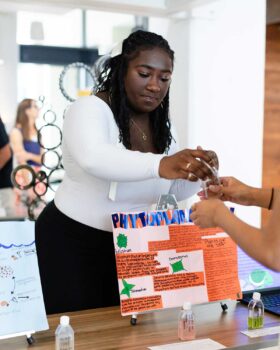
LEAP organizers are exploring partnerships with other local colleges to expand the program. They are excited to review data collected from each cohort to find out more about student outcomes.
“It’s about helping these students find what’s the right place, is it a four year college, is it a tech school or is it a job – did they take more science and math classes when they went back to their high school? So I think at the end of this three-year program we will have a pretty good sense of the impact, even if it is a small group of students, that they are going places that they might not have had the aspiration to before.”
“The LEAP program has given me more confidence in speaking and opening up more. I’m usually more shy and closed off, but this new experience, being around other high schoolers and the support given from my leap mentors, has opened up a whole other side of me. I’m excited for what the future holds,” said Ayeka O’Connell, a rising junior at Carver High School.
According to the U.S. Department of Labor, STEM occupations are projected to grow by almost 11% by 2031, over two times faster than the total for all occupations.

